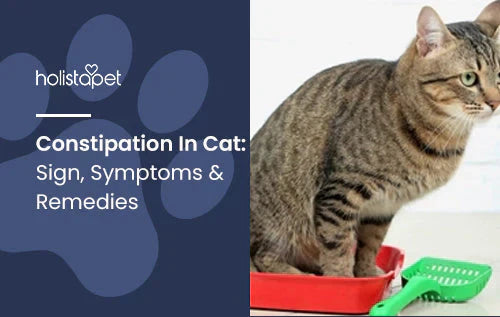Parasites are painfully pesky for cats, leading owners to wonder how to get rid of them. From searching the web for the best home remedies for ear mites to rushing their cats to the vet, it can get confusing how to act accordingly. Most cases of external parasites will be treated with a topical or oral medication, however, we recognize that these products may be intimidating to some and offer up a few at-home remedies.
What are Ear Mites?
Ear mites are one of the most prevalent parasitic infestations that affect cats. Luckily, there are several remedies for ear mites in cats you can try at home. If you believe your cat has ear mites, it's nothing to be overly alarmed about. While humans are immune to many parasites, cats and dogs are perfect breeding grounds for these creatures.
Ear mites are nasty little parasites that enjoy the environment inside of your cat's ears. The ear canal is where these parasites thrive. They are very contagious, especially to other cats and dogs, and are very common. The most frequent ear mite infestation in cats is Otodectes cynotis. Several ear mite medicines and websites also refer to it as Otodectic Mange.

Home Solutions For Ear Mites in Cats
Since ear mites are such a common cause, there are several home remedies to help owners with this affliction:
Miticide
If you're wondering what kills ear mites in cats instantly, Miticide is an excellent choice since it contains a natural insecticide called pyrethrin. When you purchase ear miticide, make sure you pick up the version made specifically for cats. Some products for dogs are not safe for your cat. Owners should follow the directions on the miticide carefully. Massage the drops into your cat's ears and clean away any residue remaining.
Apple Cider Vinegar
Mix a solution of equal parts warm water and apple cider vinegar into a spray bottle and shake it up. Apply to the hair and skin to reduce ear mites in cats. If your pet is not fond of water bottles, you can dip a cotton swab in the solution. Then, place the saturated cotton swab on your cat's upper inner ear so that the solution slowly leaks down into the canal. Repeat this ear mite treatment for cats once a day for two weeks.
Organic Honey
Owners can put three teaspoons of organic honey in a bowl and then dip a cotton swab in it. Apply the organic honey to remove ear mites in cats, but do not drip the honey down the ear canal. Owners can mix one teaspoon of honey with one cup of distilled or sterile water.

Garlic and Olive Oil
Garlic and olive oil have anti-inflammatory properties, which is perfect for bites of ear mites in cats. Owners can let 2-3 garlic cloves soak in olive oil, or mix garlic powder into the oil. A pinch of garlic powder added to a teaspoon of olive oil is enough. Apply the mixture to the infected areas. This method should be repeated daily for at least ten days.
Aloe Vera
Aloe vera is anti-inflammatory, antiviral, and antibacterial, making it one of the best plants to use against ear mites in cats. Owners can apply organic aloe vera to their cat's ear. Your cat is likely to lick some of it, but it's safe to ingest and is even good for the digestive system.
CBD (Cannabidiol)
While CBD is not necessarily a remedy for ear mites in cats, it may offer relief from the itch and discomfort caused by them. You can find a variety of CBD for pet options on our convenient online shop page. If your cat has mites you can make use of these home remedies and also provide your cat with some CBD to make them comfier while healing.
How Do Cats Get Ear Mites?
Understanding the causes of ear mites in cats is essential for prevention and effective treatment. Here's a detailed look at how these pesky parasites invade your cat's ears:

- Transmission from Other Animals: Ear mites in cats are highly contagious and often spread through direct contact with an infested animal. Cats can contract mites from another cat, dog, or furry friend, particularly in multi-pet households where animals frequently interact.
- Contaminated Environment and Objects: Ear mites in cats can also spread via contaminated surfaces or objects. Toys, bedding, or any surface used by an infested animal can harbor mites, which then latch onto a new host. Poor ear hygiene can make it easier for mites to thrive in a cat's ear canal.
- Outdoor Exposure: Outdoor cats are at higher risk of encountering infected animals or contaminated surfaces, increasing their likelihood of contracting ear mites. However, even indoor cats can become infested if they come into contact with mites brought inside the home.
- Communal Living Spaces: Places like kennels, catteries, or shelters are hotspots for ear mite infestations. The close quarters and frequent animal interactions make it easy for mites to spread. If your cat has recently been in such an environment, they may be at risk of infestation.
- Poor Ear Hygiene and Underlying Health Issues: Cats with poor ear hygiene or existing health issues are more prone to ear mite infestations. Wax and debris buildup in the ears create an ideal environment for mites, and cats with weakened immune systems or ear infections are less able to fend off these parasites.
Related Article: Home Remedies for Fleas on Cats [Helpful Tips Inside!]
How to Check for Ear Mites in Cats
If your furry friend contracts ear mites, the symptoms will be very obvious. Your cat will be itching the ears, head, and neck constantly. This scratching can lead to chunks of hair loss and excoriations/raw spots that creates other infections. Left untreated, excessive scratching and licking from ear mites can lead to pain in cats.
Untreated ear mites in cats can cause them to misbehave or act differently than they usually would. Is your cat scratching furniture for the first time or lashing out, even at you? These negative changes in behavior could indicate they have contracted ear mites or that something else is wrong with your cat. In this instance, a veterinary professional is the best next step to evaluate your pet.
In some instances, when stress or pain accumulates it can lead to aggressive behavior in cats. It's important to note that excessive itching, hair loss, and behavioral changes can also be symptoms of other underlying health issues. When in doubt, you should always get a second opinion from a veterinarian.

Prevention of Cat Ear Mites
Prevention against ear mites in cats is no easy task, and the best thing an owner can do is be attentive. Check your cat's ears daily for inflammation, redness, irritation, or discharge and debris. Make sure to stay up to date on vet check-ups. Your cat's ear should be a pale pink color, as long as there is no residue or odor. Your veterinarian may provide a pH-balanced ear cleanser to help decrease dryness and itchiness, as well as parasite prevention and medicine if needed.
Great For Cats: CBD Product for Cats
Final Thoughts
Ear mites in cats might be a common issue, but that doesn't make them any easier for your pet. They will cause itchiness and inflammation that can lead to irritation scratching. Some cats will tear chunks of their skin out from scratching too much, leading to nastier infections. If your cat has ear mites and other infections simultaneously, please contact a vet. That may be a sign of a far more significant underlying medical ailment.
If you judge that it's just a contained infestation in the ear, try the home remedies listed above. Remember always to use organic products and never insert objects into your cat's ear canal without a vet's recommendation. We hope these remedies may help your cat, while you're here why not take a moment to learn more about our brand Holistapet! Or you can browse more home remedies for cats.
FAQs
Can Ear Mites Spread to Other Pets?
Yes, ear mites in cats are highly contagious and can spread to other pets like dogs, especially in multi-pet households or communal spaces such as shelters and kennels.
How Long Does It Take to Get Rid of Ear Mites with Home Remedies?
Most home remedies take around 10-14 days to be effective, and consistent application is key to eliminating the mites and preventing re-infestation.
Can Ear Mites Lead to Other Health Problems If Left Untreated?
Yes, untreated ear mites in cats can lead to secondary infections, severe ear damage, behavioral changes, and pain due to constant scratching and irritation.
Should I See a Vet If Home Remedies Don’t Work?
If home remedies don’t show improvement after two weeks, or if your cat’s symptoms worsen, it’s important to consult a veterinarian for professional treatment.
Are Outdoor Cats More Prone to Ear Mites?
Yes, outdoor cats have a higher risk of encountering infested animals or contaminated environments, but indoor cats can also contract ear mites if exposed.
Can Indoor Cats Get Ear Mites?
Yes, even indoor cats can contract ear mites if they come into contact with contaminated objects, other infested animals, or mites brought in from outside.
How Can I Clean My Cat's Ears Safely at Home?
You can clean ear mites in cats by gently wiping the outer ear with a cotton ball soaked in a vet-recommended ear cleaning solution. Avoid inserting anything into the ear canal without a vet’s guidance.
Read Next: The Best Home Remedies for Mange in Cats [6 Effective Methods]



 CBD Oil for Cats - Fast Acting
CBD Oil for Cats - Fast Acting
 CBD Cat Treats - Easy Dose
CBD Cat Treats - Easy Dose
 CBD Calming Chews for Cats - Highly Rated
CBD Calming Chews for Cats - Highly Rated
 CBG Oil for Dogs and Cats - Loved by Thousands
CBG Oil for Dogs and Cats - Loved by Thousands





2 comments
Betty
Helpful but wish I had access to this info much earlier. Have been feeding a feral cat for yrs now. When I first trapped & had her fixed the vet told me she has ear mites. But as she was/is now less feral I still cant bring her to a vet like a regular cat. I thought she has an abcess but could be an ear hematoma. Further guidance would be appreciated if available.
Velma Turner
Thank you . Tis info easy read and very helpful
Leave a comment
All comments are moderated before being published.
This site is protected by hCaptcha and the hCaptcha Privacy Policy and Terms of Service apply.